Disney executives could not help but notice a few things during the 1990s. One: even accounting for inflation, science fiction films continued to do very well at the box office, if not quite grossing the same amounts as the original Star Wars trilogy. And two, many of the fans who flocked to Disney animated films, theme parks and the newly opened Disney Cruise Line were teenagers. Why not, executives asked, try an animated science fiction or adventure film aimed at teenagers? It would be a bit of a risk—the company’s previous PG animated film, The Black Cauldron, had been a complete flop. But they could bring in directors Kirk Wise and Gary Trousdale, whose Beauty and the Beast had been a spectacular success, and who had also added more mature elements to The Hunchback of Notre Dame. It was worth a try.
In theory.
Wise and Trousdale jumped on the offer. They had no interest in doing another musical, and had some ideas about a potential adventure film. Where exactly those ideas came from is a slight matter of dispute: the directors claimed that the film’s initial major inspiration came from Jules Verne’s Journey to the Center of the Earth, their own researches into legends of Atlantis and the writings of Edgar Cayce, and Indiana Jones films. A number of critics and fans claimed that the film’s major inspiration came from the Japanese anime Nadia: The Secret of Blue Water, which I have not seen, in another example of Disney lifting from Japanese anime, consciously or not. Wise and Trousdale both strongly disputed the anime claims.
Regardless of the inspiration, the directors and executives agreed on a few elements. One, the new film would absolutely, positively, 100% not have songs, and especially, it would absolutely, positively not have a power ballad. That particular decision did not go over well with the Disney marketing department, now accustomed to—some said fixated on—attaching a potential top 40 hit to each and every hit. As a compromise, one was snuck into the closing credits. The song, “Where the Dream Takes You,” was a total flop, but at least tradition had been maintained. Two, Atlantis would absolutely, positively, not follow the post-Aladdin tradition of adding a celebrity comedian sidekick: this had not worked well for them in Hunchback of Notre Dame. Comedic characters, sure—in the end, the film had about six of them—but not a Robin Williams/Eddie Murphy/Danny DeVito/Rosie O’Donnell type. Three, the new film would have a new language. They hired linguist Marc Okrand, who had helped develop Klingon, to develop Atlantean. Four, the film would be animated in the old fashioned, CinemaScope ratio, as a homage to the old adventure films.
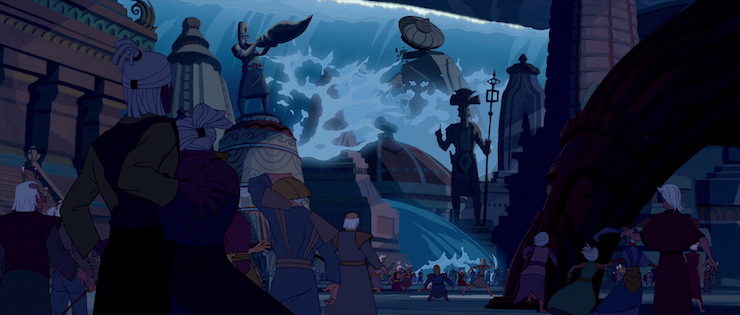
Wise and Trousdale also wanted—and got—ongoing changes to the script, often well after sections were animated, and often to the film’s detriment. Animators, for instance, had almost finished the film’s prologue—an exciting bit of animation featuring the robotic Leviathan killing a group of Vikings, preventing them from reaching Atlantis. Exciting, certainly, but the directors and story supervisors, somewhat belatedly, realized that introducing the Atlanteans as the sort of people who sent killer underwater robots after Viking explorations was perhaps not the best way to make them sympathetic. The prologue was scratched and replaced with a sequence showing the destruction of Atlantis, and introducing Nedakh and Kida as sympathetic survivors of complete cataclysm, trapped on an island sunk far, far beneath the sea.
This was perhaps not the wisest move. On its own, the new prologue, which featured the flying ships and air machines of Atlantis, ended up raising more questions than it answered. For instance, given that the people of Altantis have flying airships, why are they still only using BELLS to alert the population of an incoming tsunami, instead of another mechanical method, especially since we just saw them using radio? Why are they wearing what appears to be Roman clothing? (This is particularly odd, given the film’s later insistence on designing Atlantis to resemble cultures on both sides of the Atlantic Ocean and even some Asian cultures, with Mayan art a particular influence. Why not use Mayan inspired clothing?) Why is Kida’s mother stopping mid-flight and kneeling down in the streets to tell her daughter that they don’t have time to let the poor little girl take all of five steps back to get her doll—especially since, as we soon see, the two of them are standing in what ends up being the one safe place in Atlantis? If you have time to tell her this and to get sucked up by high energy beams, surely you have time to rescue a little doll?
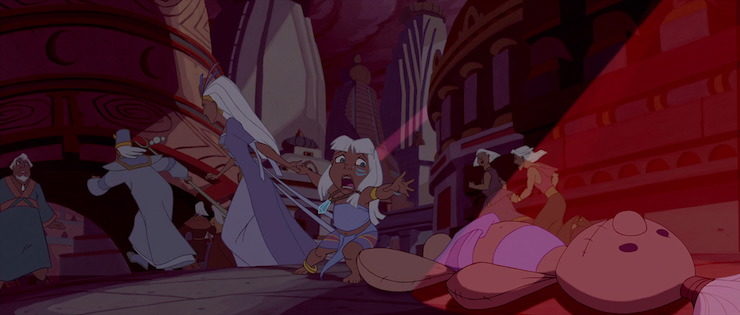
Perhaps more importantly, the prologue established that Kida and Nedakh and the other Atlanteans were alive both during the fall of Atlantis and in 1914, the date of the rest of the film—making them four or five thousand years old, give or take a few thousand years. Which raised still more questions: what are the Atlanteans doing about population control, given that they are trapped within a relatively small area with limited resources and a very long lived population? Since at least some of them could remember the surface, did any of them ever try to return to it, and if so, why did they (presumably) fail, given that at least initially, they had access to robot technology? Why—and how—did they forget how to control their flying robot machines? How can Kida later claim that her fellow Atlanteans are content because they just don’t know any better when, well, they clearly do, given that they can all presumably remember, as she can, the days before the destruction of Atlantis?
Also, why are there flying dinosaurs in Atlantis?
Also, given that Kida and Nedakh lived in Atlantis before its fall, why exactly do they need a geeky 20th century American scholar to translate their language for them? Were they—the ruling family—simply never taught how to read?
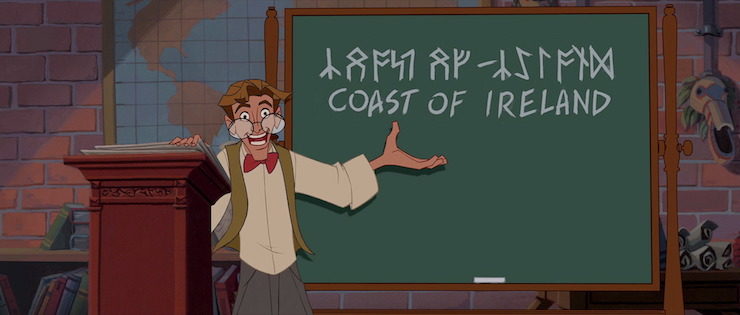
Which brings me back to the plot of the film, which, after the destruction of Atlantis, focuses on Milo, a hopeful scholar whose real job is to keep the boilers going at the Museum (i.e., the building that would eventually become the Smithsonian Institution, since this film really wants you to know that it knows that the Smithsonian Institution wasn’t called that in 1914). After a sad day of not getting funding (many of you can probably relate), Milo trudges home to find a Mysterious Woman With Great Legs sitting in the darkness. This would be the tipoff for anyone not named Milo to realize that something decidedly hinky was going on: as a seven year old watcher wisely pointed out, “Good people don’t turn off the lights like that.” Milo, however, is so excited to be getting his funding—and an incredible amount of it, enough to cover a small army, submarines, bulldozers, and trucks—he ignores the extreme wrongness of this all and joins the crew as they go off to explore the Atlantic.
(Earth to Milo: most archaeological digs do not require a military escort, and you’ve been working long enough at a museum to know this.)
Said crew includes the usual misfits, most speaking in heavy ethnic accents: the cute Mexican engineer girl, an Italian demolitions expert, a cook who somewhat inexplicably thinks that stuff served only in inaccurate movies about the Wild West is appropriate chow for a sub, the creepy French guy very into dirt, the Mysterious Woman With Great Legs, a stern military officer whose agenda is apparent to everyone but Milo, a nice friendly black doctor who also knows Native American healing, yay, and elderly radio operator Wilhelmina Packard, the hands down standout of the group and the film, more interested in gossiping with her friend Marge than in small details like, say, the imminent destruction of the submarine she’s on.
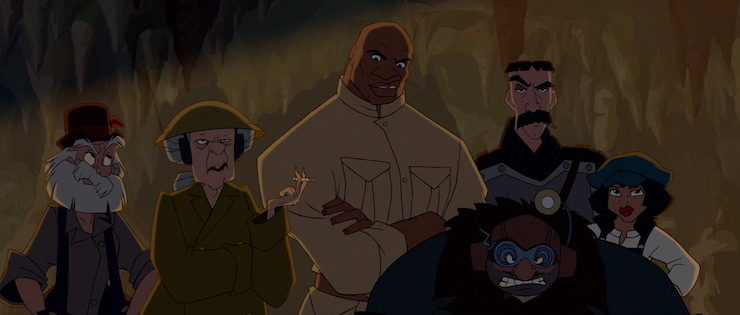
Off the team of misfits and redshirts go, diving down, down, down into the Atlantic Ocean, where—despite the inevitable bragging that the submarine is indestructible and nobody needs to worry, the submarine turns out to be very destructible indeed and everyone needs to worry. Fortunately enough they end up in a series of caverns hidden well beneath the ocean, conveniently marked out with a nice if somewhat bumpy road. Hijinks ensue, until the team reaches Atlantis and some flying dinosaurs, and things start to go very wrong. Not just for them, but for the film.
By this point, Atlantis has been under the sea for thousands of years, and things aren’t going well: the lights are going out, they can’t remember how to turn on their flying machines, and they can’t fix anything because they can’t read their native language—see above. Fortunately, since Atlantean is a “root language,” they do have an immediate grasp of all contemporary languages, including French, Italian and English, a quick way to handwave any potential communications issues and ensure that subtitles won’t be needed. Those of you about to point out that learning Latin does not exactly lead to fluency in Italian, Spanish, Portuguese or other Romance languages should be warned that this film is not safe viewing for linguists.
It’s at this point where the film pretty much stops making much sense at all if you try to think about it, which I advise not trying. Basically, the dark skinned Atlanteans have forgotten how to use any of their advanced technology, even though the robot Leviathan and various glowing crystals are still working just fine, and it seems highly unlikely that all of the Atlanteans would have forgotten that the crystals are basically keys for the flying vehicles, but moving on. So anyway, the Atlanteans are in a pretty bad shape, and about to get into worse shape now that the military part of the adventuring crew has arrived, prepared to steal the Atlantean power source, without even one person saying, “Uh, given that this power source completely failed to stop the cataclysm that sank Atlantis to the sea, maybe we should try to find some other energy weapon to use in the soon arriving World War I instead.” Or even one person saying, “Huh, so if this power source comes from the energy of the Atlantean people, will it work when all of them are dead? ‘Cause if not, maybe this isn’t the best way to go.”
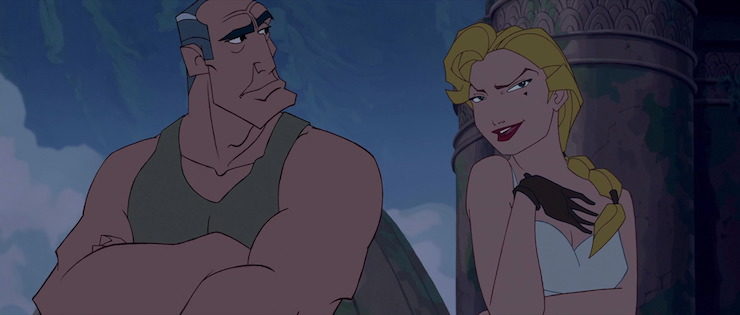
Of course, since the once-advanced (and dark skinned) Atlanteans are now down to using just spears, and because their badass leader princess has been mostly incapacitated, this means that it’s up to Milo and the motley crew to try to stop the evil general and the Mysterious Woman with Great Legs.
In other words, it turns into a pretty standard White Guy Saving the Ambiguously Racial Culture.
It’s a pity, largely because Kida is introduced as a kickass character who should and would be able to save her people and her civilization all by herself—if only she hadn’t forgotten how to read, leaving her completely dependent on Milo’s translation skills. And if only she wasn’t spending most of the film’s climax trapped in an energy container unable to do anything. So instead of getting to be an action hero, she spends most of the film yelling, getting yelled at, or turned into an energy beam for others to fight over—making her in some ways even more passive than Cinderella and Snow White, who are able to take control of at least part of their destiny through hard work.
The film fails Kida in other ways as well. It’s more than understandable that her main focus is on deciphering her culture’s forgotten writing and restoring their energy system; it’s considerably less understandable for her to be so quickly trusting of the first group of strangers she’s seen in thousands of years, especially given that several of them virtually scream “DON’T TRUST ME” and one is a slimy guy who tries to hit on her within seconds. It’s also considerably less understandable for her—and the other Atlanteans—to take so little interest in, well, everything that’s happened for the last few thousand years outside Atlantis.
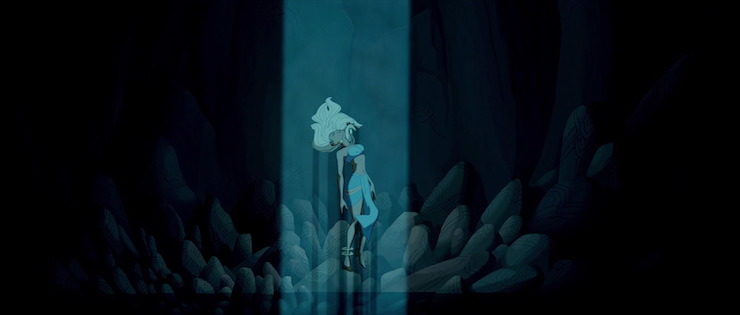
Though mostly, this feels less of a failure for Kida, and more like a wasted opportunity: two cultures who have not met for thousands of years, one rapidly advancing through technology, another partly destroyed by advanced technology, and now losing what little they had. It could have been a fascinating clash. Unfortunately, it’s mostly dull.
Arguably, the most frustrating part of this: here and there, Atlantis: The Lost Empire, contains moments and sequences that do hint at something more, something that could have been great. The entire underwater exploration sequence, for instance, is hilarious and occasionally thrilling. Sure, not all of it makes a lot of sense (if the submarine is powered by steam, which last I checked usually requires fire, why hasn’t the submarine burned up all of its oxygen?) and some of the more thrilling parts seem to be directly borrowed from Titanic (specifically, the dash from the boiler room and the realization that the submarine is doomed), and I have no idea how, exactly, all of the trucks and other equipment that appears later in the film managed to get pulled into the escape vehicles and survive, but even with all of these issues, it’s still a pretty good action sequence. None of the secondary characters are well developed, but a number of them are fun to watch, and I’m kinda delighted to see the engineering role filled by a tough talking Hispanic girl who has actual goals. I also kinda found myself feeling that Milo would be better off with Audrey than with a 5000 year old princess who is frequently frustrated by him, but that’s a minor point.
And as said, pretty much everything Wilhelmina Packard does is golden, even if the film never does answer one of its most gripping questions: did that guy ever come back to Marge? Did he?
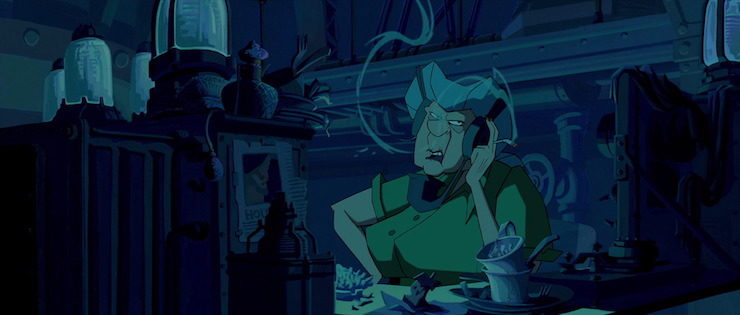
But the biggest failure of the film is that so much of it, apart from a few sequences here and there, is simply boring. Partly, I think, it’s because even with the revised prologue, Atlantis: The Lost Empire gives us very few reasons to care about any of its characters other than Milo and arguably Wilhelmina. Plenty of people die, but mostly offscreen and unseen. To its credit, the film does include a scene meant to make us care about the various mercenaries who drowned fighting the Leviathan, but it’s a bit difficult, given that most of these guys were barely on screen. Two later deaths, though enough to earn the film’s PG rating, feel equally empty. But mostly, it’s thanks to a film that, however expensive to produce, simply doesn’t seem to have spent time thinking how any of this works, or how any of it should be paced.
Not helping: the animation. In an early scene, Milo taps a fishbowl with a goldfish, and it’s almost impossible, in a Read-Watch project like this one, not to flash back to the goldfish in Pinocchio and sob a little. It’s not just that Cleo the goldfish is more delicately shaded, and rounder, but that the artists in Pinocchio went to huge lengths to have the glass and moving water change what she looks like. Atlantis: The Lost Empire doesn’t. A few scenes here and there—the journey down to Atlantis and the final set piece—do contain some beautiful frames, but for the most part, the animation is at a lesser level than most other Disney films, despite the $100 to $120 million budget and assistance from computers.
Technically, even with that budget, Atlantis: The Lost Empire pulled a profit, earning $186.1 million at the box office—though, after marketing costs were factored in, this may have been a loss. For Disney, it remained a box office disappointment, especially in comparison to two other animated films released the same year: Dreamworks’ Shrek ($484.4 million) and Pixar’s Monsters, Inc. ($577.4 million). The film Disney had hoped would launch a new line of animated science fiction films had just been thoroughly trounced by the competition.
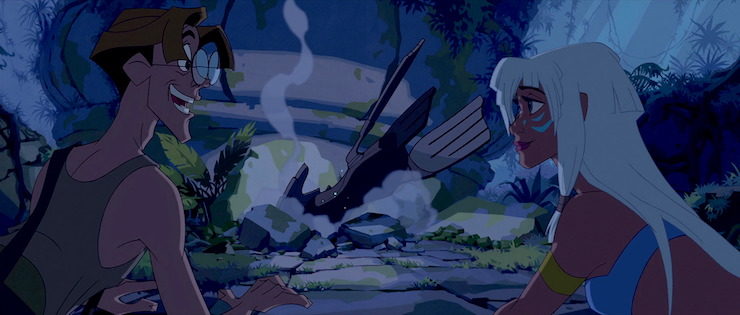
That did not keep Disney from releasing the usual merchandise of toys, clothing, and Disney Trading Pins. Disney also released yet another terrible direct-to-video sequel, Atlantis: Milo’s Return, cobbled together from the first three episodes of a hastily cancelled TV show, and several video games. Art from the film still appears on several of the Disney Cruise Line ships, and Disney continues to sell some fine art products inspired by the film.
And yet, most of the merchandise except for a couple of trading pins soon vanished. Kida became one of only four human princesses in Disney animated films not to join the Disney Princess franchise. (The others are Eilonwy from The Black Cauldron, a film Disney prefers to forget, and Anna and Elsa, who as of this writing are still not Official Disney Princesses, but rather part of a separate Frozen franchise.) In just a few years, the ambitious Atlantis: The Lost Empire was one of Disney’s forgotten films, used largely as an argument for the studio to move away from the work that had built the company in the first place: hand drawn animation.
Not that the studio was quite done with hand drawn animation or science fiction—yet.
Lilo & Stitch, coming up next.
Mari Ness lives in central Florida.










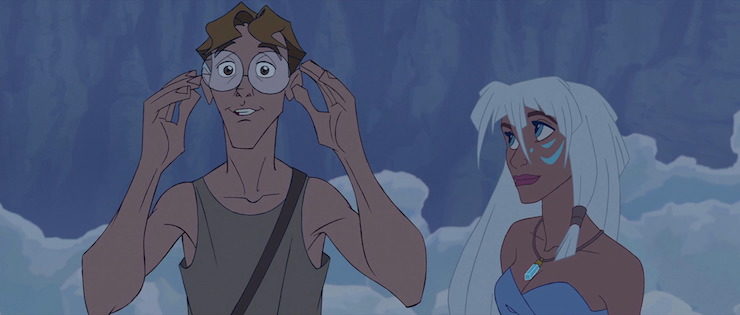
Great write-up, fingering all the problems with this one. The fact that Leonard Nimoy was a voice in it was the only thing that got me interested enough to watch the movie. Well, and I like Michael J. Fox, too.
The James Garner-voiced character is certainly animated a little on the nose, yes?
Note to self: watch Lilo and Stitch before next week.
What gets me about the “Atlantean translation” stuff Milo does in the movie is that, as can clearly be seen on the chalkboard in that screencap above, the Atlantean script isn’t actually a foreign phrase for “COAST OF IRELAND,” but simply a cryptogram of the English phrase, with the fake alphabet substituted for the Roman letters. (It’s still 5, 2, 7, and the two occurrences of O use the same symbol, as do the two occurrences of A.) This is an annoying common practice in SF/fantasy productions that use made-up alphabets — almost always, they’re just substitution ciphers that can be deciphered as English text, rather than genuinely representing a different language. Normally they’re just background text showing on a viewscreen or something, so it hardly matters, but in that scene above, it’s important to the story and the audience can clearly see that it’s just a cryptogram of the English phrase — in fact, I seem to recall that the scene explicitly portrays his decipherment as cracking the substitution letter by letter, which makes no bloody sense — so it’s like they’re making a point of showing us how lazy they are. Which is bizarre, since they had Marc Okrand on hand to create an actual language, so why not have him translate “Coast of Ireland” into Atlantean and then transliterate that into Atlantean script? Maybe they thought that would make the translation scene too complicated, but it’s just so lame.
Not to mention, of course, that Ireland wasn’t even called that thousands of years ago. The earliest name recorded for it in Greek sources (c. 300 BCE) is Ierne, which is likely derived from the indigenous name Ériu.
I think I agree with your assessment of this one. I was greatly disappointed, as the film had great potential.
My favorite aspect of the film: Mike Mignola’s character designs.
My least favorite: The fact that it’s highly unlikely that the Atlantean written langauge would have a 1-to-1 mapping to English. Ireland vs Iceland? Really. Ouch.
My fan theory for this one: John Darling, after his visit to Neverland, became a little unhinged from reality. In response, the Darlings sent him to live with his maternal grandfather in the states, where he underwent a sort of reconditioning. To help attain distance from these events, he adopted a new name, including his grandfather’s surname. And that new name, of course, was Milo Thatch.
The Black Cauldron roxxxxxxxxxxxxx. One of my fave animated films ever, right up there with Beauty and the Beast and Fire and Ice.
Quick, what movie am I describing? A nerdy scientist, with a theory not at all accepted by the general scientific community, is recruited by a mysterious woman for a mission only made possible by his translation of ancient directions. The mission is led by a military man with a secret ulterior motive. Once at their destination, they discover a city populated by people inspired by ancient Earth cultures. The scientist befriends the daughter of the city’s leader, including a scene where they bond over language.
Of course, I’m talking about Stargate. Atlantis is a totally different movie. Totally.
If we’re counting Disney Princesses that are 3D, then aren’t there 5 “missing” princesses if you count Vanellope from Wreck-it Ralph? I don’t remember seeing her in a Diz Princess line-up, but I’m not exactly up-to-date on all their marketing.
I really liked a lot of Atlantis. Mostly the individual characters, the one-liners (Packard and Vinnie are so great!), some of the visuals, the basic concept. However, the story is definitely lacking and doing a disservice to those fantastic character concepts. The beginning had so much set up that became useless really fast due to the rush. The Atlanteans losing their heritage made no sense. Kida was completely wasted….yep.
@4/aethercowboy: Oh, yeah, that’s the part I was thinking of. Ireland vs. Iceland. They actually made it an explicit plot point that it was a substitution cipher based on the modern English spellings of the names of those islands, and that the mistake Milo fixed was that they’d gotten a single letter wrong. That was just. So. Dumb. Even aside from the impossibility that ancient Atlantean would’ve been a cryptogram for modern English, how could these people not have realized that there’s more than one country whose name is spelled “I_eland”?
I talked about the ancient names for Ireland — Iceland, of course, didn’t have that name until c. 870 CE, and the indigenous spelling is “Island” (which actually does mean “ice-land” rather than “island,” confusingly enough).
I hear this film is a cult classic, yet meh to the world at large. Makes sense. It’s not good, but I have a special fondness for it.
It’s weird, but in an understated way, not the utterly-ridiculous-and-knows-it of The Emperor’s New Groove or the utterly-and-obliviously-ridiculous of, say, The Three Caballeros. It has many logistical and moral Problems, as you describe. It has no songs. Not much emotional depth. And I think a story about sunken Atlantis should have a lot more marine life than I recall. (My favorite take on Atlantis is in Dear Dolphin, a spectacularly weird and wonderful book by Herbert A. Kenney).
But…
Milo earns his place as the page image for “Adorkable” on TV Tropes. The humor is a mix of nerdy, snarky, and slapstick. Oceans are involved. The threat is bigger than in many Disney films, but still personal. And I flipping loved the hilarious and so-quotable antics of the crew of misfits.
Kida: “So…cookies are sweet but yours is not, your doctor is kindly but that’s not his name, Audrey is sweet but she is not your doctor, and this tiny digging animal, Mole, he is your pet?” Milo: “Close enough.” Yep. X-D
I’m not surprised this film got a PG rating. I am surprised that nearly all of Disney’s previous films didn’t. How did they get away with that?
Fun fact: Whitmore has a tank with a coelacanth, a believed-extinct fish “discovered” alive (by Western scientists) in 1938. TV Tropes thinks this is “probably meant to show, in the most obscure possible way, that Whitmire’s been exploring the world long enough to find all sorts of hidden things.”
Other fun fact from TV Tropes: Wilhelmina Packard and the waitress in the Emperor’s New Groove were voiced by the same person in the Norwegian dub.
Also accodrding to them, the sequel (which I didn’t watch) reveals the truth about Mole’s ‘unspeakably horrific’ backstory: He was raised by naked mole-rats. And what is wrong with that, may I ask?
This is the last Disney movie I remember seeing in the theater when it was actually released; a friend of mine and I were on vacation, staying with my aunt and uncle up north and we went to see it. I think I must have just graduated high school, so I guess I was the target audience (maybe a bit on the older side).
I remember enjoying it for being different at the time (although of course I missed the songs!) and will still enjoy it, but you bring up a ton of good points regarding the storytelling and contrivances.
I also got a heavy Stargate vibe from it. Doesn’t help that there is a spinoff show called Startgate Atlantis which always seemed to have a similar title font to me. Also I feel like Milo LOOKS a lot like Daniel Jackson in the movie.
The characters were good, the actors were good, the story concept was good. Somewhere something went wrong in joining them all together though, because this movie is awful. I mean just dreadful.
They needed the Evil Overlord List Rule #12:
A five year old child should have been read the final script, because the plotholes are so obvious a five year old could see them.
For some reason, Audrey always reminded me of Elinor from Bakshi’s Wizards. Something about the look.
They can ‘strongly dispute’ all they want.
As someone who has seen both, the similarities are both stark and damning.
Whilst the story execution is different, everything from the character design, to motivation, and even situations and visuals are quite similar.
For anyone interested, here is a very rough summary. In fact it just skims the surface: http://www.newgrounds.com/lit/atlantis.html
We should not be surprised though. Simba/Kimba set a very profitable precedent for Disney. So much so that they are now ‘remaking’ it.
I did like all of Mike Mignola’s design work; I just wish it would’ve been in service to a better film.
And it seems so reminiscent of Stargate because both Atlantis and Stargate are drawing heavily from the same influence — “lost race” stories as invented by H. Rider Haggard (King Solomon’s Mines; She) and filtered through Edgar Rice Burroughs (about 3/4 of the Tarzan novels).
Although given the weird high tech/mystical thing, they could probably be said to be more in the tradition of A. Merritt (The Moon Pool; The Face in the Abyss).
@@@@@6 Andrew Your Stargate point is well-taken. I’ve not seen Atlantis at all – knew nothing about it – and the write-up description immediately made me think that it seemed very much like Stargate.
Also, yes, the Ireland/Iceland thing was incredibly grating.
The thing about the Atlanteans not being able to read their own language or fix their own machinery could have been fixed with a very short scene establishing that the survivors consisted of the king, who had been blinded, and a bunch of preschoolers.
I liked this one right up to the point where they actually get to Atlantis. There are a lot of funny bits with the different characters. It doesn’t help that the villains were my favorite characters until they not only turned evil, but stupid evil. Watching the Evil General and the Girl with the legs explore the word with their misfit crew would have been awesome. (That sub, great technology porn)
Then they get to Atlantis and it becomes a slog mostly because, as the review pointed out, the atlantians are kinda dumb and thoroughly boring, even Kira.
Kira does have the great line though,
“Don’t worry Milo Thatch, you will not be harmed.”
For one brief second, Kira and the crystal were actually badass and scary. It was a great threat, unfortunately, it wasn’t followed up on.
@18/Jenny Islander: I’d say the simplest way to fix the “forgetting” problem would be to have the Atlanteans be the distant descendants of the originals, rather than being the same people thousands of years old. Indeed, I wonder if that was the original intent — that these were the descendants who’d lost the knowledge of their ancestors — but somewhere along the line, it was decided to make them the same people, and the filmmakers didn’t consider the contradiction that introduced.
@20 CLB–I totally agree. It seems to me that a lot of the logic problems would be solved if we were dealing with distant descendants of the original Atlanteans, and I also wonder whether that wasn’t the original intent. I can’t imagine why they decided to make these people the survivors of the Atlantis disaster. What was the point of that? The only thing I can imagine is that they wanted us to connect with Kira in the disaster scene and care about her for that reason. Am I missing anything? Can anyone figure out any other reason why the creators might have decided to go with The Five-Thousand-Year-Old People?
3. That isn’t a made up alphabet but runes on the blackboard which makes the whole language mystery even sillier. I really appreciated your comments.
5. Black cauldron was a fairly typical example of the Disney studio of that time translating a book out of all recognition into the dumbed down Walt tropes and cliches. If you never had read that epic series it had some cute moments. If you could ignore the misogyny.
I just reviewed the first few minutes of the film on YouTube to confirm my memory: the Ireland/Iceland point is explicitly stated in the film to be based on a translation of a *Norse text*, which Milo corrects based on cross-checking against a runic inscription on a Viking shield. That takes care of pretty much every objection that everyone has raised about that point.
While Old Norse is one of the ancestor languages of English, it still doesn’t make sense that a Viking inscription is an exact transliteration of modern English.
@23/Scott: Actually it makes it worse, because Norse is not English, so the runes would not spell out “COAST OF I_ELAND” at all. Online dictionaries don’t give me any Norse words for “coast,” but “shore” would be fit. The Norse spelling of Iceland is Island. I can’t find out what the Norse name for Ireland was, but it surely wasn’t “Ireland.” If we assume the Norse called Ireland by the Irish name Eriu, for example, then “shore of Ireland” would probably be something like Eriufit and “shore of Iceland” would be Islandfit. So there’s no way in hell that the Norse words for “coast of Ireland” and “coast of Iceland” could possibly be mistaken for each other, and they certainly wouldn’t be written as a 3-word phrase that lined up exactly with the English translation. Translation is not simply transliteration.
As for the illiteracy thing, there they had some ground to stand on. Socially and economically, Pre-1250BC Mediterranean dark age palace-building cultures peaked very sharply. Part of what this means was that it was possible to lose everybody in a city state that knew how to read their own language (or weave cloth particularly well, for that matter) in a single bad day, since there weren’t but a handful of them, all specialist-scribes trained by their immediate predecessors at rates fit only for direct replacement, and they were all hanging around the same citadel-complex. Which happened.
The thing that comes to mind is that Atlantis suffers from editorial meddling. If an editor had seen the entire story before it got past the storyboarding phase, they would have seen the holes in it. Today it’s a lot easier to do this.
Ignoring the coincidences between Stargate or Nadia of Blue Water, or Avatar (2009 film.) You could pretty much use the “The Heros Journey” as the story framework for every film that stars a Male character who is called to adventure. So what makes so many of these stories feel similar is because they are. The comparison to Nadia seems to be cherry picked (I haven’t seen it myself) but if you cherry pick only the similar details and leave out everything else, of course these are going to be similar, because they all follow the same story framework.
Disney’s “Princess” films all follow rules that were established with the previous musical films, which themselves were based on musicals. Animated musicals were designed to appeal to kids. One could say that Disney has had more success with these films because nobody else was doing either (Musicals or lead characters that are Female.) Male audiences tend to be dismissive of musicals today because they detract from the action. Action movies today are so overloaded with CGI/special effects that they can be described as special effects porn.
Here’s where I find things Disney does a bit concerning. Every “princess film” is marketed entirely as “This film has a princess in it.” Including Atlantis. That’s the “come take your girls to the theater” lure. So all Disney needs to make any film a princess film is make a Princess-ex-machina.
The words on Milo’s blackboard in the image shown in the post are the Anglo-Saxon Futhorc, and a direct translation of them is something along the lines of “Koeost oef Ikeolond”. I think. So, you know, it’s a direct substitution cipher with English, rather than an actual translation. It’s a shame, really – they could have put in some effort, you know? It’s not like looking up the Old English words for “coast” would have killed them. Not to mention how they used a hard “K” where they should have used an “S”, which is an extremely rookie mistake.
Being confused about the Old Norse words for Iceland and Ireland isn’t as unlikely as you’d think, though – the prime example I found while googling was the account of Ohthere of Hålogaland, where people apparently aren’t sure what exactly he means when he writes “Iraland” – Ireland is the logical translation, but from the context it seems like it might mean Iceland (usually “Ísland” in Old Norse). Or he means Ireland and is ignoring Iceland entirely.
Also, of course, modern-day Swedish has the two places as “Island” and “Irland” – literally a letter away from each other. I’m fairly certain that the other Scandinavian languages share that feature.
@28/Neveron: I think you mean that’s a direct transliteration of the symbols, not translation. Transliteration is substituting the letters, translation is interpreting the meaning.
And yes, I can buy modern languages calling Iceland and Ireland by variations of their modern names, but we’re talking about what’s supposedly an ancient Norse text, so it’s doubtful Ireland would even have been called that at the time.
Whatever its flaws, Atlantis had two things going for it:
1) A terrific score; it’s up there with Treasure Planet — done, not coincidentally, by the same composer — as one of my favorite movie soundtracks. (The wretched end-credits song is the first track on the album, so easily skipped.)
2) It was, at the time, one of the few cinematic examples you could point to when explaining steampunk to someone.
AeronaGreenjoy wrote: He was raised by naked mole-rats. And what is wrong with that, may I ask?
As long as they’re named Rufus…
Scott wrote: That takes care of pretty much every objection that everyone has raised about that point.
The only objection it “takes care of” is that it explains why they didn’t consult Marc Okrand, since it wasn’t translated from Atlantean (which uses a completely different script).
@29. ChristopherLBennett
Whoops, you’re completely right – they’re just trying to spell the English words with Futhorc runes, yes. (And somewhat poorly at that.)
However, I maintain that the confusion is possible – not because every modern Scandinavian language call them some variation on Ísland and Írland, but because we have an actual example of this thing occurring; like I mentioned:
[…] on þæt steorbord him bið ærest Iraland, & þonne ða igland þe synd betux Iralande & þissum lande […] & ealne weg on þæt bæcbord Norðweg.
[…] To starboard is first of all Iraland and then those islands which are between Iraland and this land […] and Norway is on the port side the whole way.
This is an Old English quote of a Norweigan seafarer, roughly 890 A.D. Note how he’s describing traveling down to England from northern Norway, and says that Iraland is off in the middle of the Northern Atlantic!
The confusion isn’t necessary for a contemporary Viking – what matters is that later linguists and historians are unsure on the subject, as real-life ones are on Ohthere’s description. (Seriously, googling the Old English passage up there got me some pages from Kristjan Ahronson’s Into the Ocean: Vikings, Irish, and Environmental Change in Iceland and the North, and apparently what exactly Iraland means has been argued about for more than two hundred years!)
It’s also worth remembering that for much of human history, spelling was somewhat optional.
@31/Neveron: Yes, with a little more research, they could’ve done that scene in a way that retained the same general concept but rendered it more accurately. But that is exactly the problem — that they didn’t do that, but just took the modern English phrase “Coast of Ireland/Iceland” and simply transliterated it letter for letter. The fact that they could’ve done something similar but more accurate with just a little more linguistic work merely underlines the fact that they were too lazy to bother. And the fact that their slapdash work is presented as an actual, crucial plot point that’s literally spelled out on a blackboard by the main character makes it more unforgiveable than if it were just some passing background detail that you could only discern by freeze-framing. I mean, it takes years to make an animated movie. How could they not have had the time to invest a little more care in this than you’d invest in solving the Cryptoquip in the Sunday paper?
I just wish the story would been in better shape WITHOUT finding out that the crew we been seeing the entire film were RANDOM GREEDY VILLAINS????!!!??, Am wondering if possibly the original first draft for this cartoon was in fact the BEST version of it before someone done the line thought it be a great idea for the whole cast to be the bad guys(they could even given the gas masked solders a line or two and even made them heroes in some scene). I have honestly hated this rather infamous movie for years and it seems for good reason too. Like the fact that Helga Sinclair(the internet can’t make heads or tails of this character if she is in fact a villain( with a very out of nowhere greedy motivation that doesn’t make sense given the fact that she is living in the mansion of a MILLIONAIRE already!!!????? )or an just what she was earlier in the film a anti-hero)who after saying her action one liner after being pushed off of the massive balloon magically disappears as the volcano erupts and is now the new but short lived threat to Atlantis. The characters except for a rather mean joke aimed at her once back at the mansion seemed to COMPLETELY forget about her!!! even Milo in the remaining running time. Am sorry but that’s just pure laziness on Disney’s part to do this to ANY characters of there’s however good or bad, it feels also like the film at one point makes Helga out to be somehow the main female lead to follow and NOT Princess Kida but then drops that idea once they actually reach Atlantis. It feels as though the finished film has this identity crisis with itself one where it WANTS so badly to be this awesome adventure film done in the mindless blockbuster set with a Indiana Jones story(and one wishes they had picked a Indy or even Lara Croft type adventurer lead as opposite to the clumsy uninteresting do nothing that is Milo)to shafted into this random storyline of “the army is EVIL and they want to this thingy because MONEY!!!” moral that has nothing at all to do with being the Indy story earlier. Heck you would NEVER guess Helga was meant to be German ether just a near genetic “action girl” who rather randomly goes from good to bad at the drop of a hat like the rest of the crew. The Atlanteans was also a big problem for me because in the end you just don’t care for Milo ending up being there king,they can’t read, there king is suddenly dead and THIS vandal is in his place, they are riding around still in those weird fish cars that they couldn’t figure there on own earlier and Kida is still a complete cipher in terms of what she actually wanted now that her people is free? from vaguely “dying?” as a whole race AND the crystal god has NOTHING to do with any of these problems! but with him and his crew ACTUALLY making things alot worse for the people of Atlantis by just causing them and not solving them. Plus i never get what Whitmore(the millionaire character)was so happy about in the end of the film ether since his “Best of the Best” crew torn itself apart thanks to this trip and just made things alot more terrible for everyone around them. It feels like the film makers could never truly decided on WHAT story they trying to tell with there finished film and it turned out to make this weakest DISNEY animated film with not much of a heart or what it wanted to say in terms of a moral(for which there really wasn’t much of one). They could have kept the crew as good all round(the anime Nadia:Blue Water is great example of this)The Atlanteans could been done with imaginative design like make them into something like mermaids or even Creatures from the Black Lagoon like and even then have the viewers care about them, they could have completely dropped the crystal god plot for a number of far more interesting ideas(heck Disney could used the plot of Conan Doyle’s Maracot Deep for this movie at least that has the devil as a villain) but somehow they did none of that for a story that just doesn’t want character development it wants action scenes, the Atlanteans are just a culture that needs “saving” for no real good story reason at all and the crew has to at random destroy itself because something like a Atlantean villain would be way beyond the film makers’s heads and making treat these people as simple children and not a newly discovered culture was not what they had in mind.
One last note is the fact that feel Helga Sinclair actually survives her fall and that she somehow still in Atlantis but nether this film or the infamous “sequel” never say anything about it. In the fact in that sequel the crew it seems suddenly give Kida of all things what seems to be Helga’s role within the team and it like the first movie is still “things are happening at random and just go with it” mindset. In the end i hope someone at Disney will rework this forgotten film into something that people would get behind and see as opposite to the original which refuses to be nothing more then a mindless action movie!.